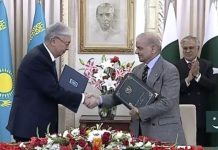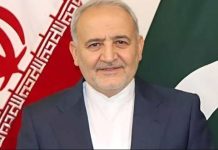Demands UN probe into banned TTP acquiring advanced military equipment
News Desk
ISLAMABAD: Pakistan has laid down new conditions for any future engagements between the international community and the Afghan Taliban in a clear and significant departure from its earlier stance that would certainly make the Kabul regime’s international recognition far more challenging.
In what was perceived as a policy announcement, Pakistan’s Permanent Representative at the UN on Thursday said any process of engagement with the Afghan interim government should be conducted on the basis of the action it takes against terrorist outfits including the banned Tehreek-e-Taliban Pakistan (TTP).
Munir Akram’s statement came at the UN Security Council session during a debate on the current situation in Afghanistan.
Pakistan, since the takeover of Kabul in August 2021, urged the international community to engage with the Afghan Taliban. Islamabad believed that the Afghan Taliban were a reality, and there was no other way but to remain engaged with them despite the international community’s reservations.
However, with tensions simmering between Pakistan and the Afghan government over the attacks carried out by the Tehreek-e-Taliban Pakistan (TTP) on Pakistani soil, Islamabad quietly abandoned advocating for the Afghan Taliban a few months ago. The Express Tribune was the first to break the story.
Today, Pakistan’s Ambassador Munir Akram officially confirmed the policy shift, and conditioned any future engagement with the Afghan Taliban on the actions it will take against terrorist outfits.
“Any process of engagement with the Afghan interim government should be conducted on the basis of the action that it takes against these terrorist organizations. Else, we will see the recurrence and proliferation of terrorism from Afghanistan as happened prior to 9/11, threatening not only the region but the entire world,” Ambassador Akram warned at the UNSC.
He said Pakistan hoped that Ambassador Feridun Sinirlioglu’s assessment will enable the Security Council and all relevant stakeholders in the international community to adopt a comprehensive, long-term and realistic roadmap for Afghanistan’s normalization.
“Any process of engagement with the Afghan interim government must be constituted on the basis of its response to the core concerns of the international community; respect for human rights, particularly the rights of women and girls; political inclusivity; and action to neutralize terrorist organisations in Afghanistan – not only Daesh, but also the TTP and other entities that threaten the security of Afghanistan’s neighbours,” he added.
Akram said the continued presence of terrorist groups in Afghanistan constituted the most significant threat to Afghanistan and to the entire region and perhaps the world.
“While the interim authorities have reported some success in the fight against Daesh, the fact is that a number of terrorist groups are living in Afghanistan, evidently under the protection of the Afghan interim government,” he told the UNSC.
“We have lost hundreds of our brave soldiers and civilians in these attacks just this year alone; and last week, a TTP-affiliated group carried out a heinous attack on our security personnel in Dera Ismail Khan, resulting in the loss of more than 23 precious lives.”

















